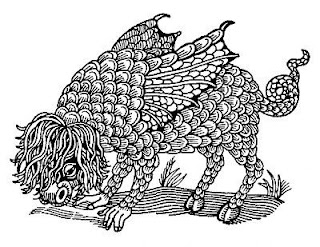 |
| Gorgon, as illustrated in The History of Four-Footed Beasts |
Three gorgon sisters, Medusa, Sthenno and Euryale, are the most famous. According to some accounts, however, their father was the gorgon Aex. Aex was the only male (or intersex?) gorgon mentioned in Greek mythology. His name meant both "terrifying" and "goat-like". He was conflated with the nymph Aex and the she-goat Amalthea, nurses to the infant Zeus. He was killed and made into Zeus' shield, mirroring the fate of Medusa's head becoming Athena's shield.
The catoblepas, another monster of Greek mythology, was propagated by medieval bestiaries through the early modern period. It was probably based on garbled accounts of the African wildebeest (or “gnu”), and is said to have a toxic gaze that withers the plants around it. Thankfully, its head is so heavy that it is unlikely to look in your direction.
Greek mythology includes various automatons created by master smiths. One of these is the bronze bull: a bull made of bronze that breathes fire. In the original Greek it is named "Tauroi Khalkeoi" or literally "bronze bull" (not "Khalkotauroi," which is a neologism coined by an ignorant Wikipedia contributor).
 |
| Gorgon, as originally described by Topsell |
In 1607, Edward Topsell published a zoological text titled The History of Four-Footed Beasts. Like many texts at the time, it mixed real and fictional animals due to the lack of accurate information. One such beast was the “gorgon,” which was a garbled mix of the myths of the gorgons, catoblepas and bronze bulls. Topsell’s gorgon was described as a scaly bull with wings and hands, and a toxic breath. The original illustration lacked the hands and wings, though later illustrations included those features.
In April 1951, the magazine LIFE published an article titled “Mythical monsters: These Beasts Existed Only in Man’s Imagination.” This article described and illustrated several monsters from medieval and early modern bestiaries. The featured monsters included the succurath, yale, and (of course) Topsell’s gorgon.
Then, in the 1970s, Gary Gygax or one of his fellows stumbled upon a copy of The History of Four-Footed Beasts or the April 1951 issue of LIFE and decided it would make an excellent addition to their newly published game Dungeons & Dragons. Thus, this misnamed “gorgon” would become a stable of the game.
This is the end of part 1. Part 2 shall trace the development of the catoblepas.
 |
| © Rudolf Freund; LIFE Apr 23, 1951 |
Relevant links (by subject):
Aex
Brass Bull
Catoblepas
- http://bestiary.ca/beasts/beast2821.htm
- http://blogicaster.blogspot.com/2009/11/capering-catoblepas.html
- http://dailybestiary.blogspot.com/2011/09/catoblepas.html
- http://monsternomicon.tumblr.com/post/58769913739
- http://www.enworld.org/forum/showthread.php?356862-Monster-ENCyclopedia-Catoblepas
- http://www.theoi.com/Thaumasios/Katoblepones.html
- https://abookofcreatures.com/2015/08/03/catoblepas/
- https://d-infinity.net/game-content/catoblepas-dd-5e-monster
- http://alphabeastiary.blogspot.com/search/label/creature%3A%20Catoblepas
- https://www.deviantart.com/popular-all-time/?section=&global=1&q=alphabeastiary+catoblepas
Gorgon
- http://dailybestiary.tumblr.com/post/23609230700/gorgon
- http://dungeonofsigns.blogspot.com/2017/05/monster-archaeology-cockatrice.html
- http://from-bedroom-to-study.blogspot.ca/2013/02/the-gorgonic-gruesomeness-of-petrifying.html
- http://penelope.uchicago.edu/oddnotes/topsellgorgon.html
- http://playingattheworld.blogspot.com/2014/02/a-fantastic-bestiary.html
- http://wesschneider.tumblr.com/post/92511929906/so-i-have-a-question-about-pathfinders-bestiary
- http://www.bestiary.us/books/mythical-monsters-these-beasts-existed-only-man%E2%80%99s-imagination
- https://abookofcreatures.com/2017/07/12/obscure-modern-monsters-freunds-mythical-monsters/
- https://www.reddit.com/r/DnDBehindTheScreen/comments/38jukf/gorgon/
- https://www.enworld.org/threads/the-secret-historie-of-the-gorgon-lamia-and-su-monster.667485/
Medusa
- http://dailybestiary.blogspot.com/2012/12/medusa.html
- http://www.d20pfsrd.com/bestiary/monster-listings/monstrous-humanoids/medusa/
- http://www.d20pfsrd.com/bestiary/monster-listings/monstrous-humanoids/medusa/medusa-greater/
- http://www.d20pfsrd.com/bestiary/monster-listings/outsiders/true-gorgon-euryale-tohc/
- http://www.d20pfsrd.com/bestiary/monster-listings/undead/beheaded/medusa-head/
- http://www.rolang.com/archives/tag/medusa
- http://www.theoi.com/Pontios/Gorgones.html
- https://forum.rpg.net/printthread.php?t=722158&pp=200
- https://web.archive.org/web/20151110054955/http://archive.wizards.com/DnD/Article.aspx?x=dnd/4wand/20130219
Minotaur
Books and Periodicals:
- Wilk, Stephen R. Medusa: Solving the Mystery of the Gorgon. Oxford University Press, 2008.
- "Mythical monsters: These Beasts Existed Only In Man’s Imagination." Life 23 Apr. 1951: 115-8. Print.
No comments:
Post a Comment